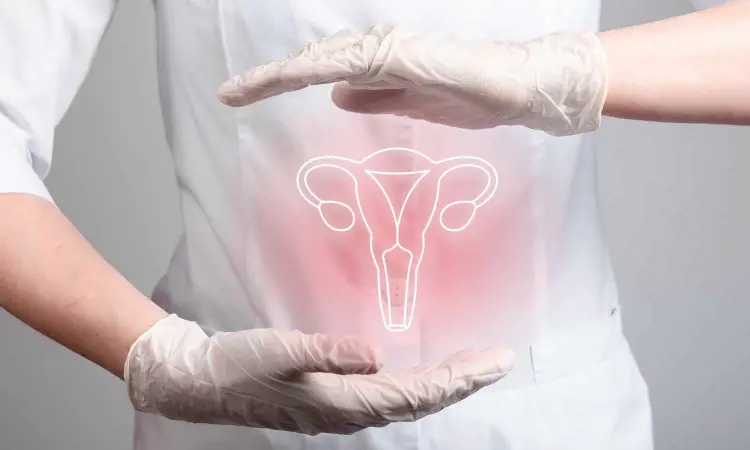- Home
- Medical news & Guidelines
- Anesthesiology
- Cardiology and CTVS
- Critical Care
- Dentistry
- Dermatology
- Diabetes and Endocrinology
- ENT
- Gastroenterology
- Medicine
- Nephrology
- Neurology
- Obstretics-Gynaecology
- Oncology
- Ophthalmology
- Orthopaedics
- Pediatrics-Neonatology
- Psychiatry
- Pulmonology
- Radiology
- Surgery
- Urology
- Laboratory Medicine
- Diet
- Nursing
- Paramedical
- Physiotherapy
- Health news
- Fact Check
- Bone Health Fact Check
- Brain Health Fact Check
- Cancer Related Fact Check
- Child Care Fact Check
- Dental and oral health fact check
- Diabetes and metabolic health fact check
- Diet and Nutrition Fact Check
- Eye and ENT Care Fact Check
- Fitness fact check
- Gut health fact check
- Heart health fact check
- Kidney health fact check
- Medical education fact check
- Men's health fact check
- Respiratory fact check
- Skin and hair care fact check
- Vaccine and Immunization fact check
- Women's health fact check
- AYUSH
- State News
- Andaman and Nicobar Islands
- Andhra Pradesh
- Arunachal Pradesh
- Assam
- Bihar
- Chandigarh
- Chattisgarh
- Dadra and Nagar Haveli
- Daman and Diu
- Delhi
- Goa
- Gujarat
- Haryana
- Himachal Pradesh
- Jammu & Kashmir
- Jharkhand
- Karnataka
- Kerala
- Ladakh
- Lakshadweep
- Madhya Pradesh
- Maharashtra
- Manipur
- Meghalaya
- Mizoram
- Nagaland
- Odisha
- Puducherry
- Punjab
- Rajasthan
- Sikkim
- Tamil Nadu
- Telangana
- Tripura
- Uttar Pradesh
- Uttrakhand
- West Bengal
- Medical Education
- Industry
Preoperative Vaginal Cleansing As Strategy To Decrease Infection Risk In Unscheduled Caesarean Delivery

A new study published in the American Journal Of Obstetrics And Gynaecology has revealed that preoperative vaginal cleansing with povidone-iodine before an unscheduled caesarean delivery following labour does not significantly decrease postoperative infectious morbidity. Caesarean deliveries are the most common major surgeries performed on women, and surgical-site infections are a significant source of postoperative complications. However, the effectiveness of vaginal cleansing in reducing infection rates has remained uncertain.
The objective of the study was to evaluate whether preoperative vaginal cleansing with povidone-iodine among women undergoing a caesarean delivery after labour would result in a decrease in postoperative infectious morbidity. The randomised clinical trial conducted by Lorene A. Temming and colleagues involved a total of 608 participants who met the inclusion criteria and were randomly assigned to receive either abdominal cleansing plus vaginal cleansing with 1% povidone-iodine or abdominal cleansing alone.
The primary outcome measured was the composite infectious morbidity, which included surgical-site infection, fever, endometritis, and wound complications within 30 days after the caesarean delivery. Secondary outcomes included individual components of the composite, length of hospital stay, postoperative hospitalization or outpatient treatment related to infectious morbidity, and empirical treatment for neonatal sepsis.
The findings of the study were:
● In the study, a total of 608 participants, with 304 in the vaginal cleansing group and 304 in the control group, were included in the intention-to-treat analysis.
● The patient characteristics were comparable between the two groups.
● The primary composite outcome, which included surgical-site infection, fever, endometritis, and wound complications within 30 days after the caesarean delivery, did not show a significant difference between the two groups (11.8% vs. 11.5%; P=.90; relative risk, 1.0; 95% confidence interval, 0.7–1.6).
● The individual components of the composite outcome and secondary outcomes did not exhibit any significant differences between the groups.
● Similar results were obtained in the as-treated analysis (11.3% vs. 11.8%; P=.9; relative risk, 1.0; 95% confidence interval, 0.7–1.6).
Based on these results, the study does not support the routine use of vaginal cleansing with povidone-iodine for women undergoing a caesarean delivery after labour. It highlights the need for further research to identify other strategies or interventions that may effectively reduce postoperative infectious morbidity in this population.
Clinicians and healthcare providers should consider these findings when making decisions regarding preoperative vaginal cleansing for unscheduled cesarean deliveries. Individualized treatment plans and adherence to existing infection prevention protocols remain crucial in reducing the risk of postoperative complications. Further studies are warranted to explore alternative strategies that may improve outcomes and minimize infectious morbidity in women undergoing cesarean deliveries.
Reference:
Temming, L. A., Frolova, A. I., Raghuraman, N., Tuuli, M. G., & Cahill, A. G. (2023). Vaginal cleansing before unscheduled cesarean delivery to reduce infection: a randomized clinical trial. American Journal of Obstetrics and Gynecology, 228(6), 739.e1-739.e14. https://doi.org/10.1016/j.ajog.2022.11.1300.
Dr Kamal Kant Kohli-MBBS, DTCD- a chest specialist with more than 30 years of practice and a flair for writing clinical articles, Dr Kamal Kant Kohli joined Medical Dialogues as a Chief Editor of Medical News. Besides writing articles, as an editor, he proofreads and verifies all the medical content published on Medical Dialogues including those coming from journals, studies,medical conferences,guidelines etc. Email: drkohli@medicaldialogues.in. Contact no. 011-43720751


